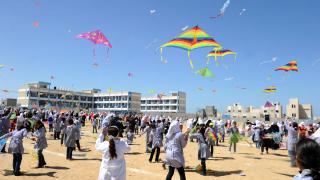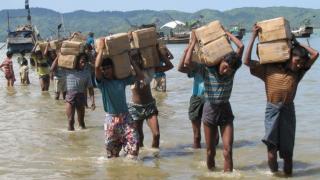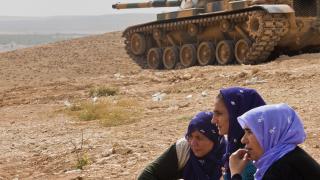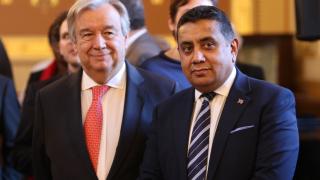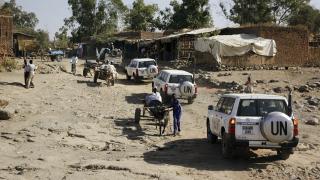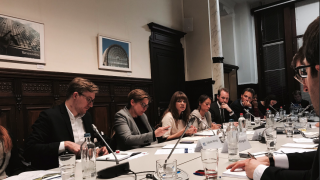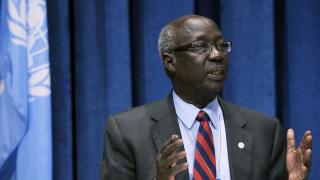
On 23 February 2012, James Kearney, Peace and Security Programmes Manager, United Nations Association of the UK, interviewed Francis Deng, UN Special Adviser on the Prevention of Genocide in New York.
J = James Kearney, Peace and Security Programmes Manager, United Nations Association of the UK
D = Francis Deng, Special Adviser on the Prevention of Genocide
J: Could you give me a little analysis of what your role actually is and what the role of your office is in the greater UN system?
D: The objectives of the Office for the Prevention of Genocide are very specific: to collect information on those situations which involve egregious violations of human rights and which, if not halted, might also lead to genocide; to act as an early warning mechanism; to alert the Secretary General and the Security Council, the United Nations system as a whole.
Those are specific objectives of the mandate, but for me the issue is how you strategise in order to address an issue that most people consider too sensitive to even talk about. I thought that the best thing would be to demystify the issue and instead of seeing it in its worst form and as it is about to happen or is happening, to think of it from the point of view of prevention, which means that early on - from the point of denial - diagnose the problem in order to strategise prevention measures.
J: Can I just interject - how do you diagnose the problem?
D: I see genocide as an extreme form of identity related conflict and this conflict emanates not from real differences but from the way we treat one another, which involves of course issues of human rights violations, egregious human rights violations of various kinds, exclusions, marginalisation dehumanisations and that then generates a reaction. If that analysis of the problem is correct, then what prevention means is how we manage diversity in a constructive way to promote a sense of equality, without discrimination, and with a sense of inclusivity and respect for all rights of groups.
J: How far is your work mainstreamed across UN departments? How do you work across the UN systems?
D: All the different offices, departments, funds, we now cooperate with them and share in the meetings, even at the country level. I think it is important to know that the UN as a whole is in a variety of ways dealing with these issues. We might not call it genocide prevention but we are talking structural prevention that goes to the things we talk about disparities, be them economic, political, social, what have you, that means that the UN system as a whole has specialised offices that are dealing with various aspects of this problem.
The [office] really becomes a catalyst; to raise awareness, alert people, advocate and define a problem in a way they can relate to.
J: Just switching a little bit to the 2005 world summit outcome document responsibility to protect, early warning and assessment of possible genocide to be strengthened. How far has that been actually realised?
D: Well, again, I think that if we see the problem as relevant to all the various specialised groups and offices within the UN system, early warning is there, everybody is alert everybody is talking about what is about to happen in different parts of the world, there are always going to be reports to the Secretary General for action, so we don’t see ourselves as the sole early warning mechanism but we have made it a point of monitoring developments worldwide, of putting classified developments into three categories, those that are more or less okay, those that could be problematic and those that are in very serious crisis, and we write advisory notes to the Secretary General as well as to the Security Council. We have a framework of analysis by which we identify a set of categories that would indicate the potential for risk factors of genocide. Recognise it from the perspective of eight categories and share the information. And where the crisis merits it we write an advisory note: a specific recommendation for action.
J: If the beginnings of the Rwandan tragedy were to occur now today, would the situation be very different because of the creation of new offices, or would we be in a similar situation because certain key governments still hold the key power?
D: There are arguments on both sides. There are people who believe that, because it is an issue of political will and we still have difficulty on this question of intervention and sovereignty, that people who believe that it could still happen. I personally believe that, not only because of this office and the concept of R2P, but also because we have had a much broader response by governments, now and as a result of the initiative by a number of governments and the GCR2P, we now have what they call focal points in different countries and they are working on networking to be able to exchange info and ideas, strategies. We still have the controversy, but I think that in any situation today, if anything near what happened in Rwanda begins to emerge, there will be a response, the response might be controversial, and there might be disagreements on how best to respond, but the world is not going to go the way they did in Rwanda.
J: A recent UN commissioned report has defined certain people and groups who could be investigated for War Crimes in Syria. Do you think this is a useful mechanism of deterrence or is it just another symptom of not being able to intervene in any practical way to stop the killing of civilians?
D: It can be very much debated, but my personal view is that this is focussing on punitive actions, which means you are accusing people that are alleged to have already committed crimes, but it’s not preventive. It often becomes a dilemma of whether you should aim at punitive action, or if you should aim at mobilising them to help find a solution. If you can create a credible expectation that those who get involved in heinous crimes will be held accountable, it could deter, possibly, people who might be inclined to commit those crimes. But like all threats, they can only be effective if they are credible. If we begin to see people who are indicted moving around, going about their jobs, getting elected, getting seen by the world, then, we discredit this criminal justice system.
J: What is your great success to date, or what would you most have liked to have accomplished by the end of your tenure?
D: I had to define the problem in a way that would make me feel that I could do something about it. If I define the problem as one of how we grossly mismanage our diversity, and see the challenge as a constructive management of diversity, then I can begin to discuss, with authority, with governments, on how to promote equality, respectful rights, as a means of promoting a sense of unity, a sense of common purpose.
Added to that, is to say that I see sovereignty, not as a barricade against external involvement, but as a concept of state responsibility for its people, and if it needs support, if it needs to build capacity with external support, then our task is to support. The reaction I have received, that is what I have found to be most gratifying, and that is what I would like to leave behind as a basis the help guide the next person on this sensitive issue.
J: Mr Deng, thank you very much for your time.
D: It’s a great pleasure, thank you for coming along.

